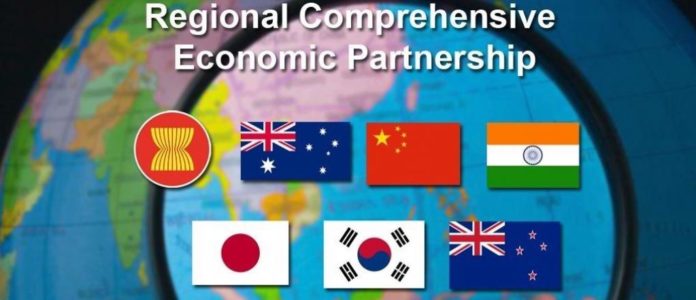The Regional Comprehensive Economic Partnership (RCEP) is a proposed Free Trade Agreement (FTA) between the ten member states of the Association of Southeast Asian Nation (ASEAN) and its six FTA partners (China, Japan, India, South Korea, Australia, and New Zealand). RCEP negotiations were formally launched in November 2012 at the ASEAN Summit.
RCEP will be the largest agreement ever as these countries account for almost 50% of the world’s population, 25% of the world’s exports and 30% of global GDP. The purpose of RCEP is to create an “integrated market” spanning all 16 countries, making it easier for products and services of each of those countries to be available across this region. Piyush Goyal attended the Intersessional Ministerial Meeting in Bangkok to negotiate the RCEP pact on Oct 11-12th.
Indian Farmers fear that if Prime Minister Narendra Modi signs the treaty of RCEP, they will likely get a lesser price for their produce if foreign players are given unrestricted access to Indian markets.
Farmers protests all over India
Farmers unions have been staging coordinated protests across over 50 places in the country demanding that the Central government keep agriculture produce and dairy sector out of the purview of the RCEP pact, a trade deal involving India and 15 other nations in the Asia Pacific.


On 10th October, protests led by Rashtriya Kissan Mahasangh – a coalition of over 180 farmer organisations from across the country – gathered at Jantar Mantar in New Delhi to protest against the RCEP agreement.
Kavita Kuruganti of the Alliance for Sustainable & Holistic Agriculture (ASHA), said, “In more than 75 districts protests against RCEP was organised on October 24-25. On 28th October, the Kerala government itself is organising a protest. Many states likewise are protesting,” adding that if RCEP is signed, Indian farmers will have to contend with cheaper produce coming in from other countries.


Farmers are concerned that the agreement could hurt their cause as cheaper imports from other nations producing commodities at a comparative advantage are likely to flood Indian markets, thereby reducing the value realised by local producers. Several industries feel India needs to be mindful of the amount of access it gives to its market.
Experts also warn about the dangers of signing RCEP. Various sectors of the Indian economy including agriculture, dairy, services, and data will be facing the heat due to the forthcoming Regional Comprehensive Economic Partnership (RCEP) according to leaked documents, experts said while talking to media on October 16, 2019.
Biswajit Dhar from the Jawaharlal Nehru University noted that India already had complete market access in most countries that were participating in RCEP. “What additional market access is India is going to get after the RCEP deal?” he asked.
This question became pertinent especially when one considered that India had foregone revenues of $5.3 billion due to preferential rates under free trade agreements in 2018 while at the same time considering releasing sovereign bonds to get some funds, Dhar added.
It was quite strange that the Bharatiya Janata Party (BJP), which had opposed similar trade deals while it was in opposition, was now going ahead without consulting even those whose very interests were at stake, he emphasized.
According to a report by newsclick, Kavita Kuruganti says- “The IPR clauses are likely to seriously impinge on farmers’ seed freedoms. We are particularly concerned about the dairy sector and plantations sector, which are going to be hit very hard,”. “There has been no rigorous and widespread evaluation of past experience in such trade deals and it makes no sense for India to walk into binding agreements without a proper review, to begin with,”
All the key agricultural States such as Uttar Pradesh, Punjab, Telangana, Andhra Pradesh, Karnataka, Tamil Nadu, and Haryana witnessed protests by farmers, who demanded India’s exit from the economic pact.
In a newsclick interview, Sanjay Parate, President of AIKS, Chhattisgarh, said: “We are launching a nationwide offensive with the AIKS and other organisations conducting strikes, demonstrations, and effigy burning against the proposed agreement. We want to take the protests further to the villages to amplify the voices of farmers.”
The All India Kisan Sabha has announced a nationwide protest on November 4.
The author is a Journalism student from Bangalore.



























